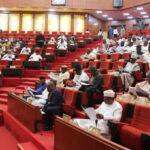
The merits and demerits of issuance of the expatriate quotas permit by the Interior Ministry to deserving foreign companies came to the fore during the budget defence session that the Minister of Interior, Olubunmi Tunji-Ojo, had with the committee on Wednesday.
The ministry said that it has surpassed its budgetary target of N600 million in revenue from the issuance of expatriate quotas in the 2023 fiscal year by raking in N1.195 billion from January to October this year.
The minister said the ministry surpassed its budgetary revenue projections on expatriate quotas and marriage.
He specifically submitted to the committee that in 2023, while N600 million was targeted as revenue to be generated from the issuance of expatriate quotas to deserving foreign firms in the country, N1.195 billion as of October 31, 2023, was generated from it.
Tunji-Ojo said, “Aside from the projected revenue from expatriate quotas that had been surpassed by about N600 million extra, the N380 million projected revenue from marriage, has also been surpassed by over N500 million with N892.774 million realised as of October 31, 2023.”
But the Chairman of the joint committee, Senator Adams Oshiomhole (APC Edo North), told the minister that while it is heartwarming that the ministry surpassed its revenue targets on issuance of expatriates quotas the policy is giving room for expatriates to steal jobs meant for Nigerians in the country.
Oshiomole said, ” Your ministry needs to regulate the issuance of the quotas very well as I have on good authority that prisoners from foreign land are working in Nigeria as construction workers.
“This is even different from the age-long fraud the oil companies have been carrying out in the country through the policy of expatriate quotas by making our qualified engineers work under foreign technicians.
“Many non-Nigerians are in the country, some of them live inside containers. I even believe and dare say that there are foreign prisoners who are working in Nigeria. They were shipped to our country to serve their prison terms.”
The committee chairman added, “They were being paid according to their country’s minimum wage by the construction industry that brought them. I don’t want to mention the company’s name but if I am provoked, I will mention it.
“Honourable Minister, this is a serious issue. Prisoners are not expected to work in their countries if the product or whatever they engage in is meant to be exported,” the senator added.
But the minister, in his response, assured the committee members that the ministry had already developed a project for job protection for Nigerians.
The project according to him, is the Expatriate Employee Network primarily aimed to safeguard jobs meant for Nigerians from being stolen by expatriates and also prevent expatriate workers from evading tax payment in Nigeria.





